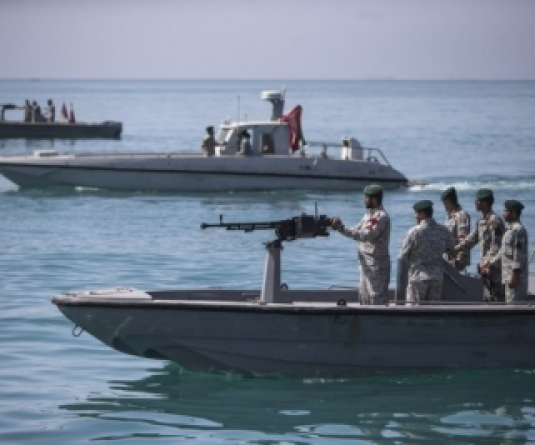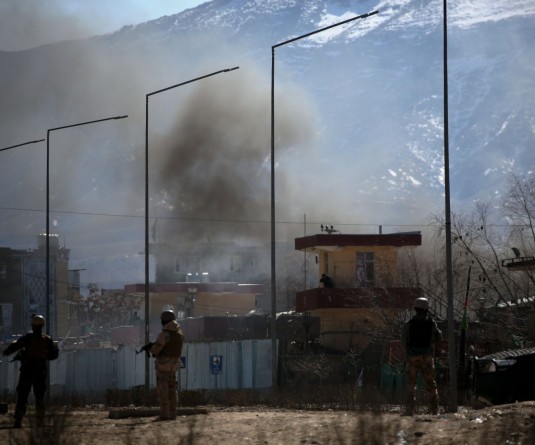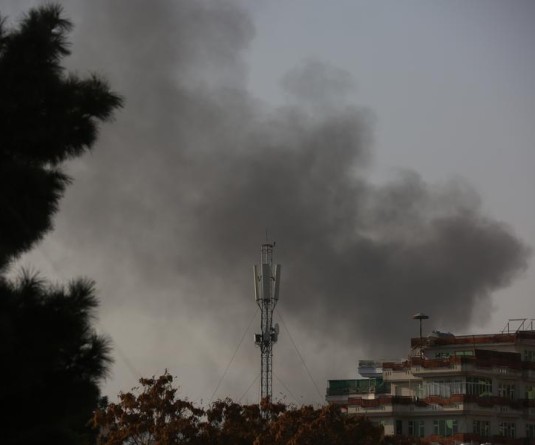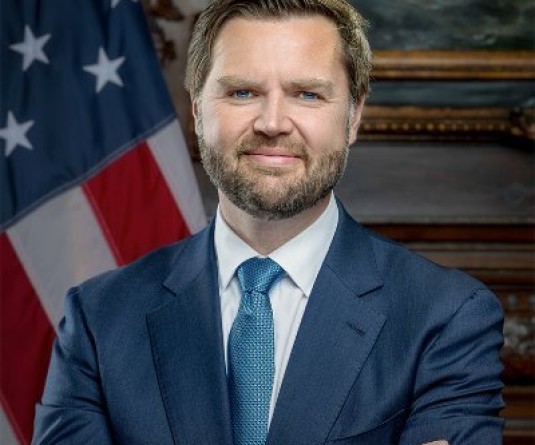Shock at G7 summit as Iran's Zarif lands in Biarritz
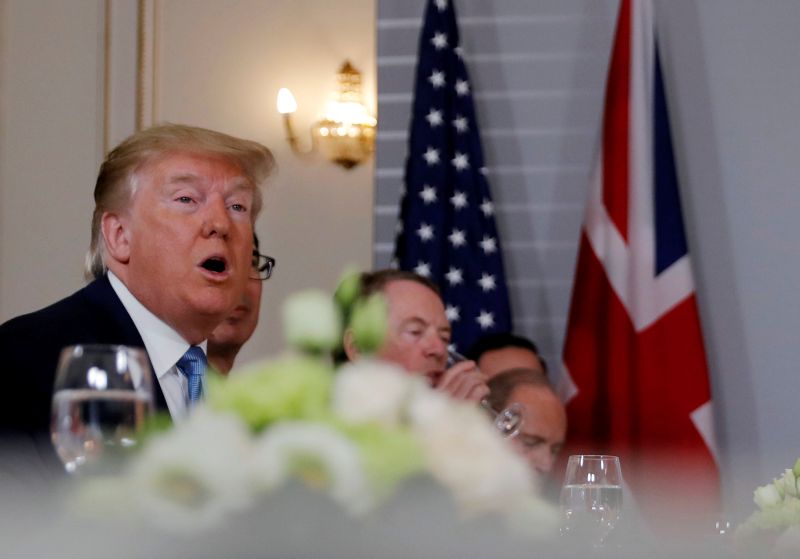
U.S. President Donald Trump speaks during a bilateral meeting with Britain's Prime Minister Boris Johnson during the G7 summit in Biarritz, France on August 25. (REUTERS Photo)
BIARRITZ, France, August 25 (Reuters): Iran's foreign minister flew into the French resort hosting a G7 summit on Sunday, an unexpected twist to a meeting already troubled by differences between U.S. President Donald Trump and Western allies over a raft of issues, including Iran.
Mohammad Javad Zarif was holding talks with his French counterpart to assess what conditions could lead to a de-escalation of tension between Tehran and Washington, a French official said.
The French official said that at this stage there was no plan for Zarif to meet members of U.S. President Donald Trump's delegation at the summit venue, the Basque beachside town of Biarritz in southwest France.
Iranian U.N. mission spokesman Alireza Miryousefi posted on Twitter: "No meeting with Americans in Biarritz."
Asked about reports of Zarif's arrival at Biarritz, which had been closed for the Saturday-Monday summit of the seven industrialised nations, Trump said: "No comment".
European leaders have struggled to calm a deepening confrontation between Iran and the United States since Trump pulled his country out of Iran's internationally brokered 2015 nuclear deal and reimposed sanctions on the Iranian economy.
Earlier on Sunday at the summit, Trump appeared to brush aside French efforts to mediate with Iran, saying that while he was happy for Paris to reach out to Tehran to defuse tensions he would carry on with his own initiatives.
France said G7 leaders had agreed President Emmanuel Macron should hold talks and pass on messages to Iran. However, Trump, who has pushed a maximum pressure policy on Iran, distanced himself from the proposal, saying he had not even discussed it.
Macron, who has taken the lead in trying to defuse tensions, fearing that a collapse of the nuclear deal could set the Middle East ablaze, met Zarif on Friday. The aim was to discuss plans to ease the crisis, including reducing some U.S. sanctions or providing Iran with an economic compensation mechanism.
"A DIFFICULT DINNER"
Trump insisted on Sunday that he was getting along well with other leaders of a group that includes Britain, Canada, France, Germany, Italy and Japan as well as the United States.
But rifts emerged on issues ranging from his quickening trade war with China to the nuclear ambitions of Iran and North Korea, and the question of whether Russia's President Vladmir Putin should be readmitted to the group.
Russia was excluded from what used to be the G8 in 2014 after it annexed Ukraine’s Crimea and then backed an anti-Kiev rebellion in the industrial region of Donbas in eastern Ukraine.
A European official who declined to be named said Russia was the most contentious issue discussed at a dinner on Saturday evening, with Japan neutral and Italy leaning slightly towards the U.S. position.
"(The conversation) became a bit tense over this idea of the G7 being a club of liberal democracies ... that point was clearly not shared by the U.S. president," the official said.
Trump's argument was that on a number of issues, like Iran and Syria, it made more sense to have Putin involved in the talks given that it is a key player there.
New British Prime Minister Boris Johnson on Sunday congratulated Macron for hosting a difficult dinner encounter.
"You're doing well," Johnson said on the sidelines of the summit. "You did very well last night, my God, that was a difficult one, you did really, you did really well."
The G7 gathering is taking place against a backdrop of worries that a global economic downturn could be exacerbated by the escalating tariff war between Washington and Beijing.
Britain's Johnson voiced concern on Saturday about creeping protectionism and said those who support tariffs "are at risk of incurring the blame for the downturn in the global economy". Sitting across from Trump on Sunday, he said: "We're in favour of trade peace on the whole, and dialling it down if we can."
Italian Prime Minister Giuseppe Conte warned other leaders of the dangers of protectionism and urged Washington not to carry through on its threat to impose tariffs on German autos.
However, the White House doubled down on its aggressive stance towards trade with China.
White House spokeswoman Stephanie Grisham, explaining what Trump meant at a news conference when he said he had second thoughts after he had raised tariffs on Chinese tariffs last week, said he meant that he wished he had raised them higher.
Underlining the multilateral discord even before the summit began, Trump threatened the meeting's host, saying Washington would tax French wine "like they've never seen before" unless Paris dropped a digital tax on U.S. technology companies.
"NICHE ISSUES"
Looking to broaden the scope of the debate, Macron has invited several African leaders to discuss problems facing their continent, while leaders from India, Australia, Chile and Spain are due to attend a dinner on Sunday where the focus will be on the environment and other issues.
However, senior U.S. officials accused Macron of looking "to fracture the G7" by focusing on "niche issues" rather than major global concerns.
France denied this, pointing to Sunday's initial session covering the economy, trade and security - areas that used to draw easy consensus but are now sources of great friction.
Trump up-ended last year's G7 meeting in Canada, walking out early and disassociating himself from the final communique.
Trump also appeared at odds with Japanese Prime Minister Shinzo Abe over the seriousness of North Korea's series of short-range missile launches.
Trump, who prizes his relationship with North Korean leader Kim Jong-un, told reporters the launches did not violate an agreement and were in line with what others were doing. Abe, sitting across from him, said they breached U.N. resolutions.
The missile launches have complicated attempts to restart talks between U.S. and North Korean negotiators over the future of Pyongyang's nuclear weapons and ballistic missile programmes.
At the start of the day, Trump said Britain would have a major trade deal with Washington after it leaves the European Union. Asked what his advice on Brexit was for Johnson, he replied: "He needs no advice, he is the right man for the job".
While the transatlantic rift is the most stark, there are also deep divisions within the European camp, with Johnson making his G7 debut at a time when he is struggling to persuade EU capitals to renegotiate Britain's exit from the bloc, which Johnson has said will happen on Oct. 31 come what may.


